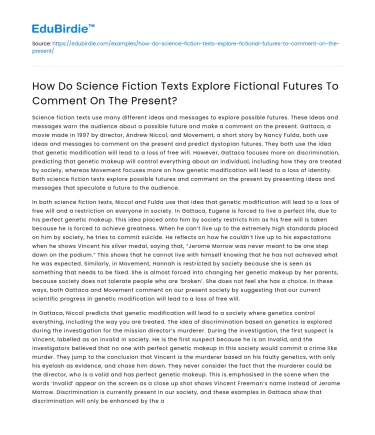Science fiction texts use many different ideas and messages to explore possible futures. These ideas and messages warn the audience about a possible future and make a comment on the present. Gattaca, a movie made in 1997 by director, Andrew Niccol, and Movement, a short story by Nancy Fulda, both use ideas and messages to comment on the present and predict dystopian futures. They both use the idea that genetic modification will lead to a loss of free will. However, Gattaca focuses more on discrimination, predicting that genetic makeup will control everything about an individual, including how they are treated by society, whereas Movement focuses more on how genetic modification will lead to a loss of identity. Both science fiction texts explore possible futures and comment on the present by presenting ideas and messages that speculate a future to the audience.
In both science fiction texts, Niccol and Fulda use that idea that genetic modification will lead to a loss of free will and a restriction on everyone in society. In Gattaca, Eugene is forced to live a perfect life, due to his perfect genetic makeup. This idea placed onto him by society restricts him as his free will is taken because he is forced to achieve greatness. When he can’t live up to the extremely high standards placed on him by society, he tries to commit suicide. He reflects on how he couldn’t live up to his expectations when he shows Vincent his silver medal, saying that, “Jerome Morrow was never meant to be one step down on the podium.” This shows that he cannot live with himself knowing that he has not achieved what he was expected. Similarly, in Movement, Hannah is restricted by society because she is seen as something that needs to be fixed. She is almost forced into changing her genetic makeup by her parents, because society does not tolerate people who are ‘broken’. She does not feel she has a choice. In these ways, both Gattaca and Movement comment on our present society by suggesting that our current scientific progress in genetic modification will lead to a loss of free will.
Save your time!
We can take care of your essay
- Proper editing and formatting
- Free revision, title page, and bibliography
- Flexible prices and money-back guarantee
In Gattaca, Niccol predicts that genetic modification will lead to a society where genetics control everything, including the way you are treated. The idea of discrimination based on genetics is explored during the investigation for the mission director’s murderer. During the investigation, the first suspect is Vincent, labelled as an invalid in society. He is the first suspect because he is an invalid, and the investigators believed that no one with perfect genetic makeup in this society would commit a crime like murder. They jump to the conclusion that Vincent is the murderer based on his faulty genetics, with only his eyelash as evidence, and chase him down. They never consider the fact that the murderer could be the director, who is a valid and has perfect genetic makeup. This is emphasised in the scene when the words ‘Invalid’ appear on the screen as a close up shot shows Vincent Freeman’s name instead of Jerome Morrow. Discrimination is currently present in our society, and these examples in Gattaca show that discrimination will only be enhanced by the advancement in genetic modification.
In contrast, Movement explores the idea that genetic modification will lead to a loss of identity. Hannah is a unique individual who has an issue fitting in with the rest of society. She is scared to undergo a procedure to make her the same as everyone else, because she does not want to lose her own identity. This is shown when she describes the life of a flytrap, saying that even though it is beautiful, with a ‘magnificent blossom’, it doesn’t have a sturdy stem, which separates it from all the other plants, and therefore cannot survive. This is a metaphor for her own life, because she is unique, but in order to survive she needs to be the same as everyone else. She is scared that she will lose her identity, but knows she has to in order to survive. She is aware that the procedure to change her genetic makeup will result in a loss of her own uniqueness and loss of identity. In that way, Movement comments on the present society by suggesting that advancement in genetic modification will lead to a loss of individuality and identity.
Overall, both Gattaca and Movement use similar and different ideas and messages to comment on the present and predict possible futures. Both explore the idea that genetic modification will the lead a loss of free will and restrict everyone in society, which makes a comment on how our current advancement in genetic modification could negatively affect society. Gattaca suggests that a society ruled by genetics will only worsen discrimination in the world, while Movement proposes the idea that genetic modification will lead to a loss of individuality and identity. These science fiction texts use varied ideas that all comment on the present by suggesting that society’s current advancement in genetic modification will ultimately lead to a dystopian future.






 Stuck on your essay?
Stuck on your essay?

